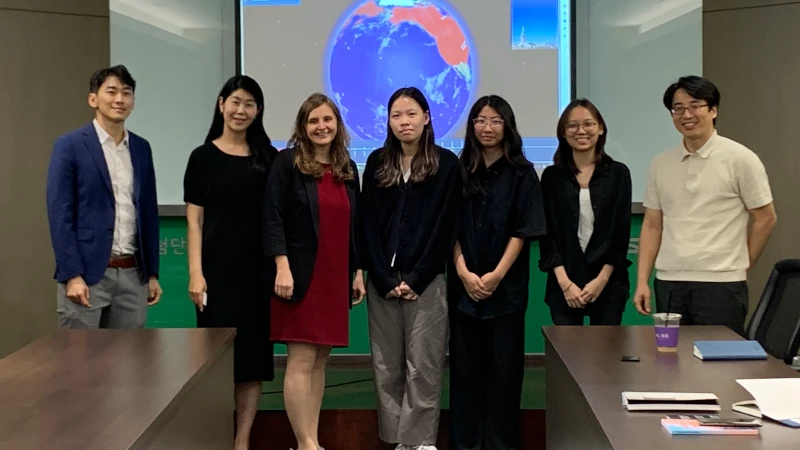Events
July 2025
Hallyu Mapping Forum in Seoul
The Hallyu Mapping Forum marked a significant milestone in advancing data-driven research on the Korean Wave, fostering dynamic exchanges between academia, policymakers, and industry leaders. Dr. Grincheva's presentations of the Hallyu Tracker to key South Korean government agencies —including the Ministry of Foreign Affairs, Korean Foundation for International Cultural Exchange, Korea Culture Information Service, and Korea Culture and Tourism Institute— highlighted its potential to transform cultural policy analysis. Engagement with intergovernmental bodies like the ASEAN-Korea Centre and industry forums such as the K-Content Academy further amplified its reach, while a public installation at Seoul Culture Lounge brought data visualization to broader audiences.
Collaborative discussions with Space Oddity explored applications for music industry development, bridging research and creative innovation. The Forum's interdisciplinary dialogue —uniting Hallyu experts, AI specialists, and data engineers— probed the intersections of AI, cultural analytics, and policy, addressing both challenges and future opportunities. By prioritizing human-AI collaboration, this initiative sets a new standard for scalable, ethical data solutions in global cultural studies, ensuring technology enhances —rather than replaces— human insight. The Forum's outcomes promise lasting impacts on Hallyu research, policy, and creative industries.
February 2025
Global Webinar: Diving Deep with Hallyu Tracker:
Data-Driven Insights into the Korean Wave
This webinar will share results of the project Mapping the Global Impacts of Hallyu, the Korean Wave by introducing its creative digital practice output, the Hallyu Tracker app. It is a data-driven mapping visualization tool designed to illuminate the intricate global network of Korean Wave (Hallyu) influence. By leveraging the power of data visualization, Hallyu Tracker offers a dynamic and interactive exploration of the rise and impact of Korean cultural products and services across diverse regions and continents. Hallyu Tracker employs a data-driven approach and AI to map the complex interplay of factors that contribute to Hallyu's global reach. Through the integration of various data sources, Hallyu Tracker visualizes the evolution of Hallyu's influence, from its initial stages to its far-reaching effects. By analyzing patterns of consumption, social media engagement, and economic indicators, Hallyu Tracker provides a nuanced understanding of the factors that drive Hallyu's success in different markets across regions. The application also highlights the potential impact of Hallyu on various aspects of society, including cultural exchange, economic growth, and diplomacy. The webinar will share the interface and functionality of Hallyu Tracker to discuss how it could be used as a research tool for scholars, policymakers, and industry professionals to gain a deeper understanding of Hallyu's global influence and inform future research and strategic initiatives.
December 2024
International Symposium "Mapping Global Impacts of Hallyu, The Korean Wave" in Singapore
The International Symposium: Mapping the Global Impacts of Hallyu took place on December 6, 2024, at LASALLE, University of the Arts Singapore.The symposium brought together scholars from around the world to present and discuss the findings of the interdisciplinary research project on mapping global impact of Hallyu. This symposium launched the Hallyu Tracker application, an AI-enabled data visualization tool designed to map the global dissemination of the Korean Wave over the past three decades. Attended by over 200 registered participants on site and online the symposium offered a platform for interdisciplinary discussions across three trajectories: geovisualization of the Korean Wave through the perspective of data-driven research and cultural mapping; geopolitical implications of Hallyu exploring it through the prisms of cultural policy, international diplomacy and global urban infrastructure consumption; the planetary power of Hallyu fandom and its economic and social implications.
Click to Learn More
May 2024
Hallyu Mapping Forum in Seoul
The "Mapping and Theorizing Hallyu" conference at Seoul National University hosted the preliminary presentation of the Hallyu Mapping project. The event showcased the project's innovative methodologies, including the development of a Soft Power Visualization Map and offered a platform for the research team to share their Hallyu studies developments. Following the conference, the research team engaged with key stakeholders, including government officials and industry leaders, to discuss the implications of data-driven research for Hallyu policy and development. These interactions provided valuable feedback and highlighted the potential of the project to contribute to a deeper understanding of the Korean Wave's global impact and inform future strategies for its growth.
Click to Learn More